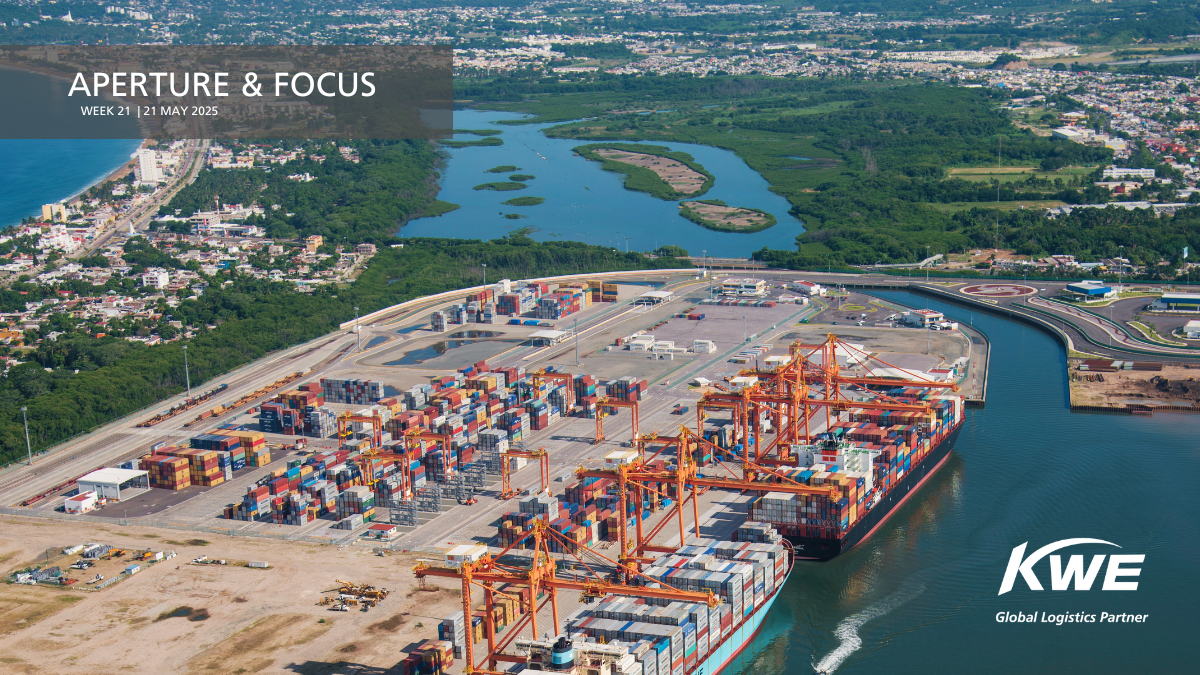Quote
Aperture & Focus 2025: Week 21

Global Aperture
Global air cargo volumes declined in early May following the May 2nd repeal of the U.S. de minimis exemption for on low-value shipments (≤$800) to the U.S. from China. Export activity from China to the U.S. dropped sharply, contributing to a broader slowdown in Asia-Pacific freight flows contributing to a broader Asia-Pacific slowdown. Capacity constraints and post-holiday lulls also dampened demand.
A new tariff truce between the United States and China is offering temporary relief to global shippers as both countries ease duties on hundreds of products. The agreement, reached on May 12th, suspends additional tariffs for 90 days while both sides negotiate further market access and trade reforms. However, shippers remain cautious, noting that uncertainty still looms over long-term trade policy. Companies are using this window to reevaluate routing, sourcing, and customs strategies amid ongoing volatility.
Regional Focus
Americas
United States: The U.S. Federal Aviation Administration (FAA) is holding a third round of talks with carriers to reduce flight volumes at Newark Liberty International Airport (EWR) due to chronic delays caused by equipment failures, staffing shortages, and ongoing runway construction. Airlines may be asked to cut or reschedule flights during peak hours, as the FAA seeks to ease congestion and improve service reliability.
The Port of Long Beach reported record-breaking volumes in April 2025, handling 867,493 TEUs. However, import volumes are expected to fall by more than 10% in May due to recent tariff changes. A temporary 90-day tariff reduction between the U.S. and China has shifted trade flows and caused carriers to readjust vessel schedules.
Eastbound international container volume moving by rail from Southern California fell 5% from the previous week, reaching its lowest level in six months. Volume is down over 26% from the March peak, though analysts anticipate a rebound as shippers accelerate activity during the current tariff reprieve.
Mexico: Operations at the Port of Manzanillo resumed partially on May 20th following a four-day customs worker strike that disrupted logistics. While bulk cargo and rail movements have restarted, officials expect it will take two to three weeks to work through a backlog of containers awaiting clearance and resume normal operations.
Asia-Pacific
Indonesia: KWE subsidiary APL Logistics has opened the Marunda Flow Center, a 32,000 sqm sustainable logistics hub in North Jakarta, positioned near key rail, air, and sea routes to support Indonesia’s export growth. The LEED Silver-certified facility features automation, solar panels, and 6,800 racking positions, with plans to reduce road congestion through a future barge service connecting to Tanjung Priok Port.
China: Hong Kong International Airport (HKG) handled 445,333 U.S. tons of cargo in April 2025, a 2.6% year-over-year increase driven by strong transshipment growth, particularly with Europe and the Middle East. Despite rising U.S. tariffs on China earlier in the month, cargo volumes remained resilient; however, the U.S. ended its de minimis exemption on May 2nd, removing duty-free treatment for low-value shipments from China, which could curb future e-commerce traffic.
Japan: The Ministry of Land, Infrastructure, Transport and Tourism has launched a new Carbon Neutral Ports (CNP) initiative aiming for net-zero emissions at all ports by 2050. A terminal-level certification program will assess measures such as low-emission equipment, vessel fuel choices, and logistics technologies, with results made public to promote industry-wide accountability and participation.
Singapore: Changi Airport (SIN) has broken ground on Terminal 5, a new facility set to handle 50 million passengers annually when it opens in the mid-2030s. The expansion is expected to boost belly hold capacity for air cargo by increasing passenger flight volume, while reinforcing Singapore’s role as a regional logistics hub through automation, sustainability, and multimodal access.
Europe, Middle East & Africa
Belgium: A nationwide strike on May 20th is expected to disrupt operations at Belgium’s Port of Antwerp, with unions targeting government austerity measures. Key logistics activities, including truck export deliveries and vessel handling, will be impacted by manpower shortages, raising concerns of delays and congestion across the North Sea shipping network.
Brussels Airport (BRU) handled over 76,000 U.S. tons of cargo in April 2025, marking an 11% year-over-year increase. The increase came from more belly cargo (+19%) and trucked cargo (+12%), while full freighter volumes dropped 9%. Asia, Africa, and North America were the main regions for both imports and exports.
Italy: Freight rail services are bracing for significant disruption due to both infrastructure repair and a national rail strike scheduled for May 23rd. Ongoing maintenance has forced key routes like Taranto–Metaponto and Gioia Tauro–Bologna to reroute or reduce capacity, while the strike may delay or cancel services across the country, including intermodal connections, including those serving Fiumicino Airport (FCO).
Sweden: Nationwide ports had a major disruption on May 21st as the Swedish Dockworkers’ Union and Transport Workers’ Union coordinated strike actions. The strike included a six-hour walkout from 12:00 to 18:00, local time, and a blockade on the use of temporary agency workers that day, calling for improved labor conditions and limits on non-permanent staffing at port terminals.